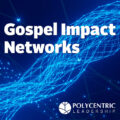
BY JOSEPH W. HANDLEY, Jr.
As our world navigates civilizational disintegration—where nation-states strain under the pressure of global systems and capitalism fails to integrate emerging realities—new models of leadership and governance are emerging. Among the most provocative voices in this arena is Michel Bauwens, founder of the P2P Foundation, who offers a hopeful, decentralized alternative grounded in cosmolocalism and commons-based governance. His vision intersects deeply with the core tenets of polycentric leadership.
From Collapse to Creativity: The Role of “Seed Forms”
Bauwens observes that transformation doesn’t begin with systems reforming from the top, but through “seed forms”—innovative, localized experiments led by people with “anticipatory consciousness.” These pioneers recognize the dysfunction of current structures and birth alternative models outside dominant systems.
“You have to exit the system because it’s no longer functioning… Seed forms come together from subsystems and then eventually become the dominant form.”
This grassroots innovation aligns with polycentric leadership’s value of diverse leadership centers—where change arises not from a single power hub but from distributed, often unexpected sources of renewal.
Translocal Networks: A Polycentric Architecture
One of Bauwens’ most radical claims is that we’re witnessing a transition from geographically bounded systems to translocal networks—interconnected communities that collaborate across space, enabled by technology.
“The big change of our epoch is that we can now organize not just locally… but translocally.”
This shift reflects the very essence of polycentric leadership: leadership that emerges across multiple centers of influence, often with shared vision but contextualized in different geographies or spheres. It fosters collaboration without requiring uniformity—empowering local autonomy while enabling global coherence.
The Commons Reborn: From Scarcity to Shared Stewardship
Bauwens points to the re-emergence of the commons as a foundational shift. After centuries of enclosure by market and state systems, digital platforms have re-enabled collective ownership and participation.
“The commons come back through the backdoor… The internet paradoxically allows for translocal sharing of knowledge.”
Polycentric leaders are often commons stewards—empowering others, protecting shared resources, and ensuring decisions are made collaboratively rather than imposed hierarchically.
Cosmolocalism: What Is Light Is Global, What Is Heavy Is Local
Bauwens’ idea of cosmolocalism beautifully encapsulates a new organizational principle: locally adapt production and regeneration efforts, while globally share knowledge, designs, and coordination tools.
“What is heavy, is local; what is light is global and shared.”
This is a powerful metaphor for polycentric leadership—where leaders contextualize strategies locally, even as they participate in shared global learning and frameworks. It honors difference while reinforcing interdependence.
Technology, Web3, and New Governance Models
Perhaps most compelling is Bauwens’ exploration of Web3 technologies—blockchain, crypto, and decentralized networks—not as fads, but as emerging seed forms for new forms of governance.
“Web3… is not just a currency. No. They’re betting on a future.”
He argues that these technologies allow for coordination beyond markets and states, enabling new “organized networks with commons.” In polycentric terms, this translates to shared authority, transparent accounting, and community-defined resource flows.
Contribution as the New Value Metric
One of the boldest proposals from Bauwens is the emergence of a new value regime based not on scarcity and profit but on contribution—recognizing positive and negative ecological and social impact.
“We are moving to the recognition of contribution… with universal accounting for ecosystems and collaborative flows.”
Polycentric leadership thrives in environments where value is co-defined, impact is relational, and metrics are transparent and multidimensional.
The Quest for New Binding Narratives
Perhaps Bauwens’ most profound question echoes a challenge for all polycentric leaders:
“What will bind us together?”
As he suggests that religion and nationalism fade as universal motivators, polycentric leadership seeks new shared stories—rooted in covenant, mutuality, and mission. It’s a leadership ethos that builds relationally, spans boundaries, and invites collaboration across difference.
🔍 Key Polycentric Principles Illustrated by Bauwens
- Decentralized Power: Governance emerges from distributed seed forms.
- Multi-Nodal Collaboration: Translocal networks coordinate without centralization.
- Commons Stewardship: Leadership protects and cultivates shared assets.
- Contextualized Innovation: Cosmolocal strategies balance global sharing and local action.
- Value-Based Leadership: Contribution and impact—not control—define authority.
Conclusion
Michel Bauwens’ vision is not utopian. It’s already happening—“in the interstitial spaces,” he says, “not tomorrow, but now.” Polycentric leaders must pay attention. These “seed forms” are not peripheral; they are the frontlines of governance renewal.
As we navigate civilizational transition, the challenge isn’t just to lead differently—it’s to see differently. And perhaps, in the spirit of Bauwens, we must stop asking, “What’s the solution?” and begin asking, “What is the right question that binds us together?”
Sources & Further Reading
- Michel Bauwens, interview on Transforming Worlds Podcast, “Transforming Governance,” Carol A. Verschoor, Substack, 2024.
- Bauwens, Michel. A Commons-Based Peer-to-Peer Path to Post-Capitalism, Antipode, 2020.
- Handley, Joseph W. Polycentric Mission Leadership: Toward a New Theoretical Model for Global Leadership. Regnum Books, 2022.









